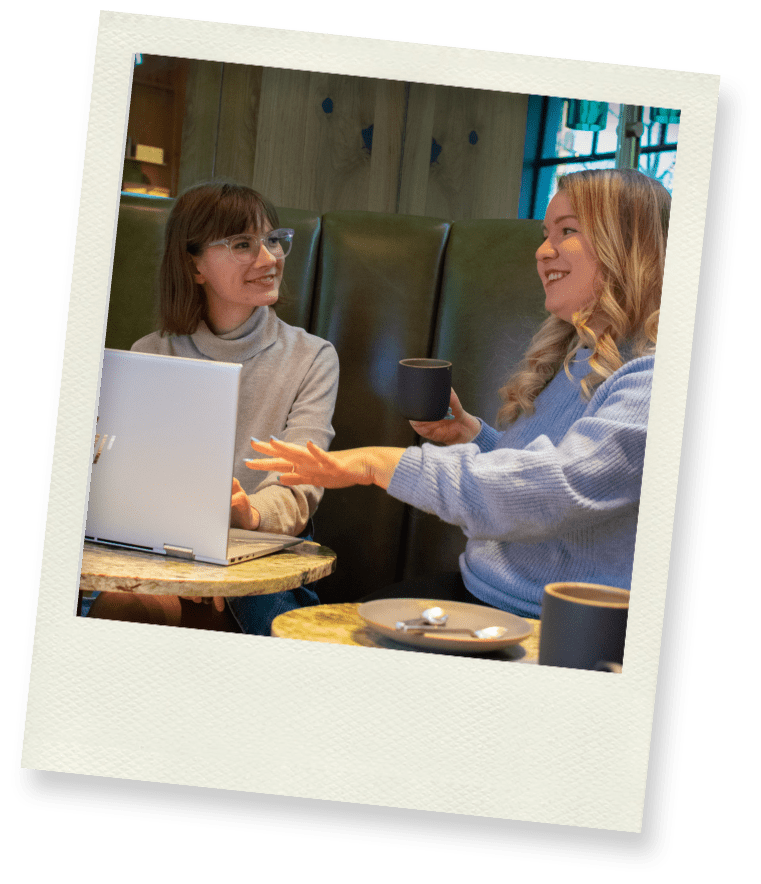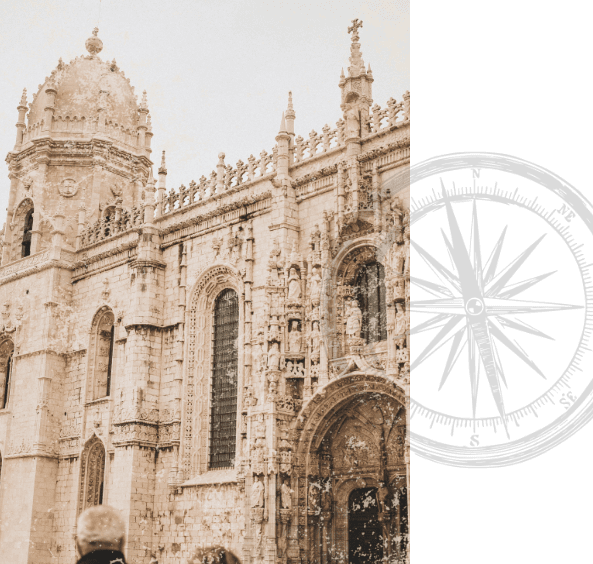In February 2020, I moved to Valencia, a beautiful coastal city on the Mediterranean coast of Spain. I meant to spend 3 months experimenting with this final place in Spain that I could actually see myself calling home. They’d be 3 months of total freedom. But less than 3 weeks later, that freedom turned into confinement because of COVID-19.
Spain before lockdown
As pretty much everyone knows, Spain’s been in one of the world’s most intense COVID-19 lockdowns since March 14th. Only one week before, my neighbourhood in Valencia, El Carmen, was packed with locals and tourists alike to celebrate Las Fallas. Many visitors even came from Italy which was already recognized as Europe’s hotbed of COVID-19. Now, Las Fallas is Valencia’s famous festival in which around 400 casals fallers – or Fallas community clubs – from across the city do parades, put up fireworks displays, and mount beautifully crafted monuments that are burned on the final night of celebrations. It’s a jam-packed, 3-week-long festival.

I got to attend the emotional and optimistic opening ceremonies in which this city found a home in my heart, promising to welcome people as Valencians from all over the world. (It was this kind of multiculturalism and openness that I missed up in Girona – you can read about why I left that city after previously experimenting with it as a home in my previous post). I’d even spent a lunch hour drinking limoncello next to a table full of kids and grown ups from a casal faller near my apartment. It was at a little Italian restaurant around the corner (where the owners treated me like family and got me drunk on said limoncello for free.)
I was feeling at home and excited about the coming weeks, much like the rest of Valencia.
The coming curve of COVID-19
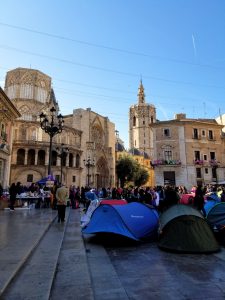
Then, after participating in one of Spain’s many International Women’s Day events on a Sunday, the situation began to change. This event, plus a local soccer game, and visitors from the first European epicentres of Northern Italy and Madrid for the start of Las Fallas were cited as accidentally contributing to a mass spread of coronavirus.
Italy had now reached high death rates and shut down. In the following days, Las Fallas was cancelled, people in Valencia and around Spain began staying close to home, restaurants closed out of precaution, schools were ordered closed, and rumours abounded that we’d be following Italy into their state of emergency. By Friday night, we received notice (and I quickly ran to the grocery store for essentials) – we were entering a 15-day period of total confinement.
I’m writing this blog post over a month later, on my birthday, April 20th, 2020. At the time of writing, Spain is still under confinement as that initial 15 days period gets renewed, over and over again.
And I’m no longer in Valencia. I’m now home in Canada drinking drip coffee.
Here’s what’s happened in between.
The first week
In a press conference that first Saturday of the so-called “new normal,” Prime Minister Perdo Sánchez of Spain announced that the COVID-19 confinement meant never going outside or getting within two metres of people outside your household. The exceptions to going outside were for:
- returning to your ordinary residence (considered force majeur)
- buying groceries
- going to the pharmacy
- going to work (if that workplace was still allowed open)
- one household member taking their dog out for a walk
- Children with autism going outside with one family member to maintain some sense of their schedule (also considered force majeur)
This was even more intense in some ways than Italy’s lockdown. And for good reason – numbers were even outpacing theirs in rapid growth. And yet, naively, I really thought we’d be out of extreme lockdown in the promised two weeks.
My life in confinement

Around 4 days in, I started going stir crazy. The flat I lived in was puny. I had a tiny room filled to the brim by a desk and bed, no living room to relax, and no outdoor space or balcony. I felt I could hardly breathe, and there was nothing to do but work. Spaniards, much like Italians, live outside in cafés, parks and plazas. This social, outdoor living is one of the reasons I love daily life in Southern Europe. But now, trapped in a tiny apartment that was really meant only to be slept in, I felt, like many Spaniards, that this lifestyle was coming back to bite me.
I kept myself optimistic and busy for a few days with the business program I had started online, but by the end of Week 1 of confinement, I felt absolutely miserable. I’d had no Vitamin D for seven days straight, had hardly stretched out or exercised between the walls of my tiny flat, and was running low on my protein stash from the last minute, unprepared grocery run I’d done the Friday before.
I also felt extremely lonely.
Alone in a foreign land
While I’d started the month with 4 other roommates, by the time of lockdown, all but one was living with me.
My Danish roommate had spent her last days of freedom with American friends who were being forced back early from their cancelled study abroad programs. She ended up deciding to sleep at a friend’s house during confinement because it was a much nicer flat.
My French roommate escaped to France before Valencia’s airport threatened to close and half of flights were grounded due to COVID-19. To make it in time, she locked everything she owned in her tiny room and took off with only a suitcase.
Meanwhile, we thought that one of my Russian roommates, the redhead, had already moved out unbeknownst to us. A week later, however, we discovered that she’d gotten trapped in Alicante, a city further down the coast, because all trains on that route had gotten cancelled for the first week of the State of Alarm.
And that left only one, Russian roommate who talked to no one, made a terrible mess in the shower, and sequestered herself in her bedroom, as my only company. It wasn’t ideal, to say the least.
Oh, hi again anxiety
Now, a week in, my pre-existing anxiety disorder hit a new high. I tried reaching out for support. My parents now called me via Skype everyday while on their lunch break (at 5pm my time). I scheduled more work calls so I could talk to people and feel like I still had a sense of meaning. And I asked for (and received) good advice from one of my mentors and her husband about how to manage anxiety without my important resources of sunshine and interaction with nature. (Here’s that list of ideas if you find yourself trapped in a similar situation).
All of this really did help.
But then, reality became clear. COVID-19 lockdowns began around the world. My Danish roommate heard about the borders closing to her country. More cases appeared in Canada and work-from-home policies were established. And in Spain, there was a renewal of total confinement to an additional two weeks, with everyone now aware that renewals would be ongoing. There was no end in sight.
My days were long. I worked and watched Youtube. My brain couldn’t focus on reading books for fun. I stretched out my window to touch a tree and feel connection to nature. I almost cried when a bird that I saw as company, sitting outside my bedroom window, flew away. And every night I clapped hard with the people at their windows in my plaza. We clapped until our hands hurt for the health care and other essential workers who put their lives at risk for us everyday. The cheers and applause of these neighbours were the only voices I heard and faces I saw in a day.
Naive no more
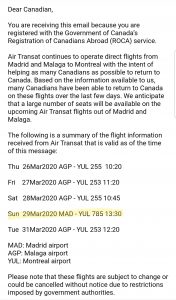
My Danish roommate came back for dinner two times. Only moving between her friend’s flat and our own. Perhaps it was a “risk” and she could’ve potentially been fined by police, but it was worth it to me. Hers was my only company. As Spain’s lockdown got more dire and cases surpassed 15,000, we spent hours before one dinner looking for a flight to get her out and back to Denmark. (The one she eventually snagged required over 24 hours of flights and sleeping at Heathrow.)
On the other hand, I thought I’d never get out because Valencia’s airport doesn’t do flights to Toronto and the trains to other cities were constantly getting cancelled. Anyways, no one without a previously scheduled or cancelled flight for the known COVID-19 confinement period was allowed to take a spot on one of Canada’s repatriation flights. Any last minute empty seats would be given only to people who showed up in person at the airport in Madrid.
I was trapped in Valencia, the city meant to represent freedom, and crying about it. I was all alone in a city I’d barely had a chance to know, counting up the days of confinement, while people were dying en masse throughout the country. It was a little slice of hell.
Finally, after my mom encouraged me to pester the Canadian Embassy in Spain, I got a mildly helpful message from them saying that some high speed trains would leave from Valencia and to keep checking in on the Air Transat repatriation flight policy for updates.
Some days later, on Sunday, March 22nd, I again checked Air Transat’s website. Spots had opened for one, single flight out of Madrid. It was their second last repatriation flight out of Spain before the program closed and I’d be officially trapped. The flight was in exactly one week. I quickly checked in with my mom and dad, and grabbed my ticket out. The flight could be cancelled any time, I learned, but now there was hope.
Making my way home
The next week was a blur. I stuffed what belongings I could into two overweight suitcases and a carry-on. The rest, I had no choice but to put in boxes for donations. At least, I hoped, someone could really use these clothes and household items to make their life a bit better once the virus had passed. I spent the rest of my time that week cooking pasta with butter, spending hours working online, and doing Zoom calls for work and with loved ones to keep me sane while in solitary confinement.
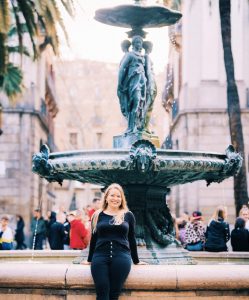
The high-speed train only ran from Valencia to Madrid on Saturday due to limited travel and plans to max out ticket sales when the train reached 30% capacity. The idea was to keep people distantly spaced. The only problem was that my flight was the following day, on Sunday. I’d have to get to the city a day early. I tried to book an Airbnb in Madrid, but by then, COVID-19 cases in that city alone had reached over 10,000 and the government decided to close all tourist apartments and hotels.
Here came my piece of luck. The woman I tried to rent the Airbnb from had hosted me once before, in September, while I vacationed in Madrid with my friend Graycen. She heard my plea and offered to let me stay in her building “as a friend” and for a bit of cash. I said a profuse thank you, had one last dinner with my Danish roommate before we both made our escapes home, and took off to Madrid, the epicentre of Spain’s COVID-19 pandemic.
I won’t go into the troubles I faced in the city except to say that it involved a flooded toilet. What matters is that I made it out of Madrid.
My flight out
The next day, I got to the airport four hours early as requested, to stand in the Air Transat check-in line at a distance of one metre from other passengers. The flight was a go. And the incredible crew at Air Transat even let everyone on the plane with all their overweight luggage for free.
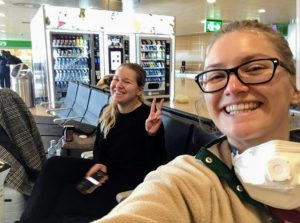
While in line, a friend of a friend recognized me from my Instagram. This was one final stroke of luck. She escaped Galicia where she’d been teaching English abroad (much like I’d done 5 years before) and we had both snagged empty seats on the flight. We kept each other company (at a social distance) for many hours in the empty airport. We even ate bagged Pringles together (which is perhaps the most upsetting, possibly apocalyptic event of them all).
Once on the plane, I got seated tightly between two couples of French Canadians while the rest of the plane was almost empty. While this made no sense during social distancing measures, we grumbled together and made the best of it. We all investigated the bagged lunches that had been placed on our seats in advance to limit crew contact, and then finally moved away from each other after take off.
Canadian Soil
I laid out across a row of middle seats and slept most of the 7.5 hour flight to Halifax. The crew that had brought us home from Spain made an announcement. The flight director thanked all of her colleagues for their bravery and hard work during these risky repatriation flights, and announced to the passengers that this was their last flight with most of them now being laid off. We clapped with appreciation for them, but the sparseness of it just made it feel sadder.
Finally, our plane arrived in Montreal for our connecting flight to Toronto. My new friend and I accompanied each other at a social distance throughout the airport, and to say thanks for the company, I bought us both a couple of iced cappuccinos from Tim Horton’s. It was undoubtedly the only highlight of our experience. Those delicious drinks gave us the energy to make it through. I felt acceptance and gratitude. Canada was going to take care of us at a time when it wasn’t right to ask that of Spain.
Several hours later, after being recommended to quarantine for 14 days (the COVID-19 Quarantine Act was absolutely NOT being enforced, but perhaps that’s a story for another day). I arrived by taxi to my Airbnb in High Park. This is where I’d spend the next two weeks in isolation, all alone again, in case I’d picked up the coronavirus. But at least here I’d have a balcony for fresh air, proper groceries dropped off outside the building by my parents, plenty of space to do meaningful work, cook, and relax. In the crisp Toronto night air, I felt I could breathe again. And most importantly of all, I could now begin counting down the days to my family home versus counting up the days spent in Spanish quarantine.
Back home

Even today, three weeks later, on my birthday, I’m still living through the time of COVID-19. But I’m back at my more liveable family home, playing outside in the backyard with my dog, and importantly, fully in the company of family. If I’d stayed in Spain, my mental and physical health might be in a darker place because it’s still in confinement, long after those 15 days. And it will be for about another month, with some relaxations hopefully coming during that time, like letting kids go outside for fresh air.
I can’t take for granted the support I’ve had from friends and family during this time. I’m also so lucky to be a citizen of a relatively safe country that helped me get home while my adopted country faces hundreds of deaths every day during COVID-19.
I’m torn in two though between each place. My time in Valencia and my relationship with that awesome city got cut short. And part of me feels as if I abandoned my second country in one of its darkest 21st century moments.
On the other hand, I’m confident this was the right decision for me. The people I know and love are also happy and supportive of me, whether they’re Canadian or Spanish. No one else sees my choice as abandonment. I have to remember that.
The new normal
So far, all of my loved ones in both places continue living. We’re all lucky enough to have our health and work. But who knows what’ll happen next?
That’s why we’re making the best decisions we can at every given moment. I’m managing my anxiety not only through changing my external environment (in the form of moving countries), but also by practicing presence in the moment. I meditate, breathe, try to get myself on the yoga mat, and go outside now that I can. For the first time in my life, this overachiever is taking it day by day. And I try to appreciate the moments of joy that do come.
If anything, this whole experience has taught me that the freedom I expected to experience in Valencia comes more from my perspective than it does from any external circumstance. Although, the outer world undeniably matters too.
Future plans after COVID-19
I’ll return to Valencia someday. That wonderful city and I aren’t done yet. We’re just taking care of ourselves for a little while. When we really get to spend time together, we’ll both be in a better state and I hope it’ll actually be a better, even more freeing experience because of it.


